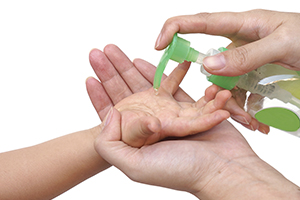I’m not always the biggest fan of the Food and Drug Administration. Their efforts to curtail access to supplements are misguided. They miss the boat with drug approvals on medications that subsequently cause injury and death. But, this time, I stand firmly behind FDA’s decision to ban anti-bacterial soaps.
Specifically, the ban extends to 19 ingredients, including triclosan and triclocarban. Triclosan was launched in 1972 and has gone on to be one of the most successful antibacterial agents used in personal care. Originally designed for hospital use, the compounds are now used in more than 2,000 everyday products marketed as antimicrobial, comprising toothpastes, soaps, detergents, carpets, paints, school supplies and even toys.
What could possibly go wrong?
Our preoccupation with germs began with the discovery by 19th Century Hungarian physician Ignaz Semmelweis that infections could be transmitted from patient to patient by doctors’ unclean hands. Widely derided for his prescient views, Semmelweis died heartbroken in an insane asylum at 47. It was not until the latter part of the century that discoveries by Louis Pasteur and Robert Koch demonstrated that germs could transmit disease.
This laid the groundwork for modern advances in sanitation and infection control. Sterilization of instruments and hand-washing with disinfectants became established practices.
Awareness of the hazards posed by germs captured the imagination of the public and spawned generations of “clean freaks.” A contemporary psychiatric condition, dubbed “mysophobia,” reflects the soaring prevalence of obsessive fear of contagion. The home care products industry obligingly responded to Americans’ new-found desire to sterilize their bodies and living spaces with a raft of powerful disinfectants.
While, intuitively, it may seem to make sense to wage total war on germs, there are some good reasons to be concerned about the proliferation of anti-microbial products.
- 1) Bacterial resistance: Bacteria mutate constantly in an effort to adapt to new environmental challenges. A new antibiotic or germ-retardant may kill 99.99% of them, but invariably, a few survive, carrying new DNA that permits them to evade destruction. These antibiotic-resistant strains pose a nightmare scenario for infectious disease experts, who are increasingly hard-put to counter “super-bugs.” Eventually, some predict, we may lose the war of Natural Selection to them as our pipeline of new antibiotics can’t keep up.
- 2) Endocrine disruption: Triclosan residues have been found in the majority of blood, urine, and breast milk samples in the U.S. Of especial concern to the FDA is the fact that even very tiny amounts of triclosan—comparable to levels obtained via average daily use of personal products—have an impact on thyroid hormone, estrogen and testosterone. They may pose a particular risk to pregnant women and their fetuses, acting as “gender benders.”
- 3) They may damage our microbiome: Chemicals that suppress bacterial growth, when ingested, might impact the delicate ecology of our gut—the microbiome—which is assuming increasing importance in our understanding of human health. The microbiome is now acknowledged to influence not just digestion, but also immunity, metabolism and even mood. Decreased microbial diversity—possibly due to antibiotics and germ-suppressing chemicals—is associated with poor health. Animal studies support the theory that triclosan impacts the microbiome, while human studies are suggestive of risk, but inconclusive.
- 4) It may pose a risk to the environment: Experts have observed: “One of the many positive features of triclosan from a formulators point of view is its stability. You stick it in a cream or a bar of soap and when you test it a couple of years later it is still there. This is great commercially – think long shelf lives . . . [This] rings alarm bells for ecologists. If a molecule is stable then it will hang around a long time in the environment.” Many studies now reveal the presence of triclosan in our streams, rivers, and soils. This has yielded a paradox: Since many water treatment plants depend on bio-degradation of waste products, triclosan may inhibit the very bacteria that are needed to transform sewage into clean water.
- 5) They may cause cancer: A recent study showed that triclosan could cause liver fibrosis and cancer in mice; another study showed it spurred the growth of breast cancer cells.
- 6) Hygiene hypothesis: Wikipedia defines it as follows: “In medicine, the hygiene hypothesis is a hypothesis that states that a lack of early childhood exposure to infectious agents, symbiotic microorganisms (such as the gut flora or probiotics), and parasites increases susceptibility to allergic diseases by suppressing the natural development of the immune system.” We recently did an Intelligent Medicine podcast with Dr. Maya Shetreat Klein, author of The Dirt Cure. A recent Wall Street Journal article entitled “Get Your Children Good and Dirty” reinforces the theme that we need exposure to germs to tune up our immune systems and overcome vulnerability to allergies and auto-immune disorders.
- 7) There’s no proof that they are any better than plain soap and water: While it may make sense that to kill germs we need “big guns,” there is no actual evidence that anti-bacterial soaps are superior to soap and water for eradicating pathogens. In a recent review, researchers looked at 27 studies conducted between 1980 and 2006, and found that soaps containing triclosan at concentrations commonly used in household products were no more effective than plain soaps. For disinfectant purposes, alcohol-based hand wipes are safer and more effective.
- 8) Bacteria on our skin actually protect us: A recent article in The Scientist states, “Human skin, the barrier between the body and the outside world, is home to diverse microorganisms, some of which can promote immunity or fight invaders.” Undermining the integrity of the skin’s natural defenses with anti-bacterial soaps may even actually increase the likelihood of staph infections, according to a recent study.
How can you protect yourself and your family in the absence of anti-bacterial products? The FDA laid out the best ways to stave off infections and illnesses:
“Washing with plain soap and running water remains one of the most important steps consumers can take to avoid getting sick and to prevent spreading germs to others,” it recommended in a recent press release. “If soap and water are not available and a consumer uses hand sanitizer instead, the U.S. Centers for Disease Control and Prevention (CDC) recommends that it be an alcohol-based hand sanitizer that contains at least 60 percent alcohol.”
Remember to keep errant fingers from your nose and eyes. Remove shoes on coming home because they track in many external pathogens. And when sick, don’t be guilty of “presenteeism” at your workplace or school.








